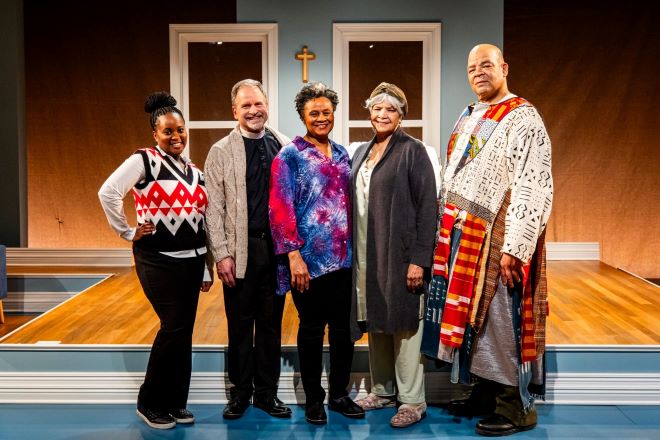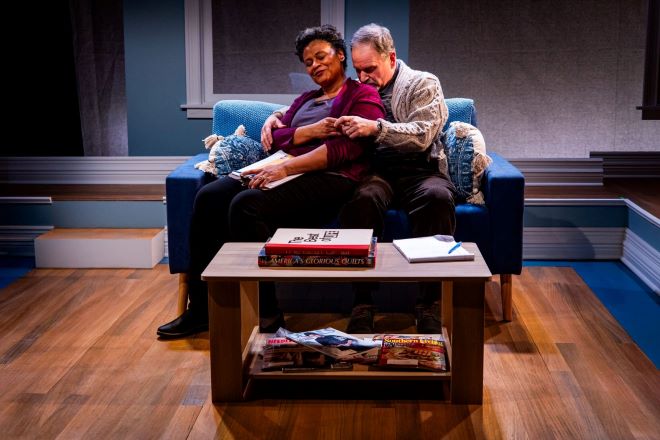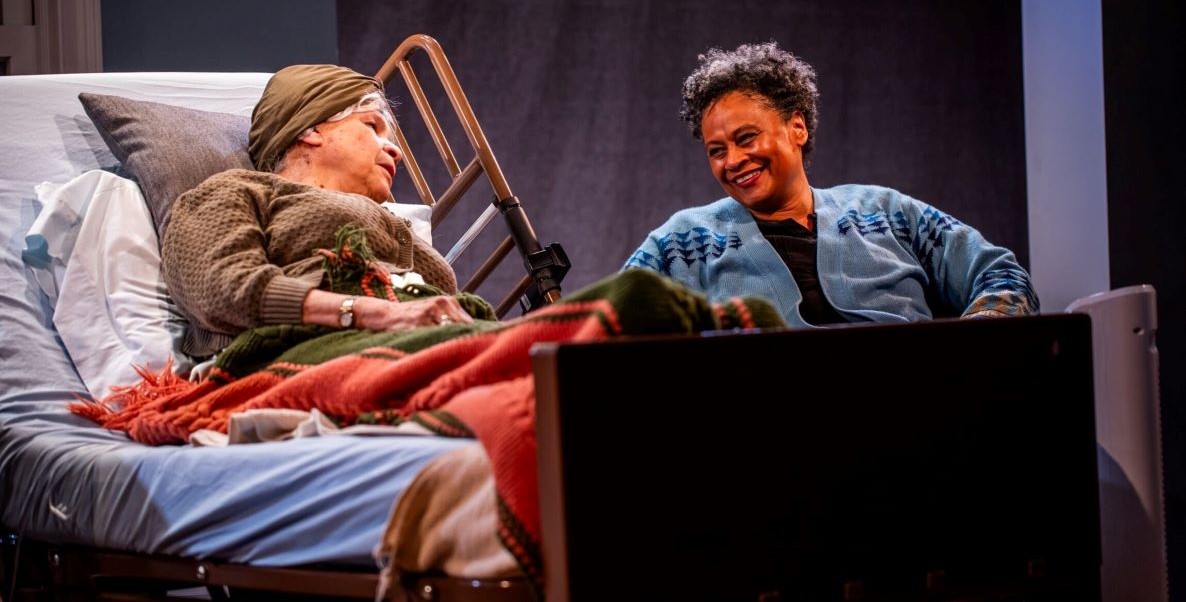Ladysitting: This is how Lorene Cary describes to her grandmother — 100-year-old Nana Jackson — that time when family members come by to see her while she lives in a room on the third floor of her granddaughter’s home, on hospice.
It’s also the name of the memoir –– adapted into the play that premiered this year at the Arden Theatre Company –– the acclaimed Philadelphia author wrote about the year-and-a-half Cary spent as her Nana’s caregiver, when the older woman lived with her and her family.
At the Arden, this “ladysitting” takes place with Tony Award winner Trezana Beverley as Nana. There, in the middle of the stage, Beverley lays on a hospital bed as Nana did when she lived on the third floor of a rectory that was then Cary’s home base. Stage right, a living room downstairs. Stage left, the dining table where Lorene (played by Melanye Finister) tells her husband, Bob (played by David Ingram) that Nana will be coming to live with them. Also in Nana’s room: oxygen tubes, a potty chair, television, a bell to ring if she needs someone, and her own night table brought from Nana’s house in New Jersey.
Throughout the 90-minute program, we delve into what it’s like caregiving for a loved one nearing the end of a long life, and the unmapped responsibility of supporting someone physically, mentally, and spiritually. It’s the kind of story our society is very much in need of. In a New York Times op-ed titled “My Family Cared for My Sick Aunt. Who’s Caring for Us?” Cary writes of the “often hidden sector of American life” caregivers and their loved ones comprise. In 2019, when her op-ed was published, AARP’s Public Policy Institute’s estimation of the annual economic value of unpaid caregiving was $470 billion. Today, it is over $600 billion.
Consider that, Cary says when we talk on the phone. That sum is based on 40 million people in America caring, in their own homes, for someone who is on hospice, disabled, close to death, or very ill, according to AARP. “If you think about that number of people, and then think about the representations we have in cultural media of people picking each other up for sex at a bar –– I think just as many people are at home taking care of somebody,” Cary says. “But we’re not honest about it. We don’t keep each other company with it.”

Things we don’t talk about
As many people as there are –– and people we know –– who look after another adult, the conversations about the day-to-day realities of this type of responsibility, work and love are too seldom for our own good. “I think there’s still some shame associated with it,” says Cary. “There are a lot of mistakes one makes taking care of a loved one in the house, and you just don’t know how to talk to people about it.
“You don’t want to talk about the times when your elderly loved one just had a diarrhea spray all over everything and you shouted to make them sit still so the shit wouldn’t go anyplace else. You come into work then, and somebody says, ‘How was it?’ — and what do you say?” She continues, “And yet it’s exactly those kinds of really, regularly trying facts that make us need company, even if it’s only literary company. So we know that we’re not alone. Many, many, many other people are doing this today.”
Then there is the way we tend to retreat back into ourselves when it comes to talking about illness, or what Cary calls “M&M”: mortality and morbidity. The author and professor Kate Bowler has written about the various acrobatics people go through to acknowledge someone’s illness in “What to Say When You Meet the Angel of Death at a Party” –– despite the fact, Bowler writes, that “we all harbor the knowledge, however covertly, that we’re all going to die” one day.
Cary says, “We so avoid talking about illness unless it’s sort of small and regular … because people don’t know how to handle the fact that you have a disease that might kill you. Or how to handle their own response. Their own worry that, Wow, if this person has that, gosh, it’s that much closer to me –– I could have it too.”
We haven’t any structured way to talk about mortality and morbidity despite their pertinence. “We have structured ways to talk about money, about sex, about material things,” –– our social media feeds and commercial lives depend on a platform for those things. The “M&M,” as Cary says, requires us to think about and ask a question that our capitalist society doesn’t really have the discipline to contemplate: “Well, now what happens?”

Really, though — it’s life
In Ladysitting, that is the question Nana doesn’t want to think about. A fiercely independent woman who lived on her own and managed her business until she was 100, Nana now has to face the one thing that none of us can control or negotiate our way out of. Brian Anthony Wilson plays the Angel of Life & Death, who visits Nana throughout the story as she becomes increasingly more anxious about what is to come.
On creating that character, Cary says: “I had to come up with some way to make theatrical Nana’s reluctant relationship with death, how that made her more and more anxious as she got more feeble. Because the more you see it coming, the more you have to slam the door on it.”
Of course it can make one anxious; thinking about our mortality requires a vulnerability we may have to cultivate — and Cary makes the case that there really is no better time than the present to do so.
In the script, Cary explains, Brian Anthony Wilson’s character is referred to as “Death,” although the description calls him the Angel of Life & Death. “But, you know, to type that out each time,” she says. “And every now and then, he’ll say to somebody, ‘Well, it’s actually the Angel of Life & Death, or more generally, Life. Why do people keep calling me Death?’ And he would say that at random times during rehearsals and make us all laugh. Like, ‘I’m Life! I’m part of life. Don’t you guys get it?’ But he had it. You’re right, Brian. You are.”
Ladysitting plays through March 3 at Arden Theatre Company, 40 N. 2nd Street. Get your tickets here.
![]() MORE ON THEATER FROM THE CITIZEN
MORE ON THEATER FROM THE CITIZEN




